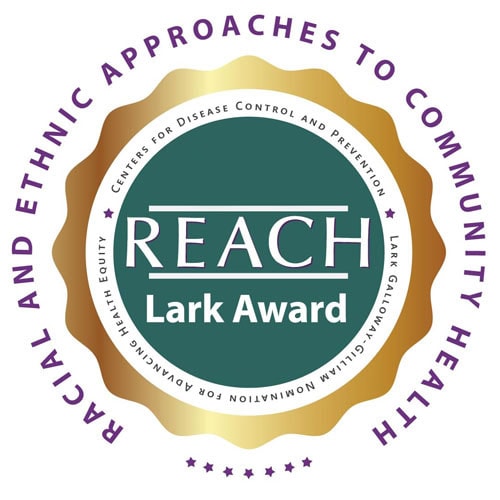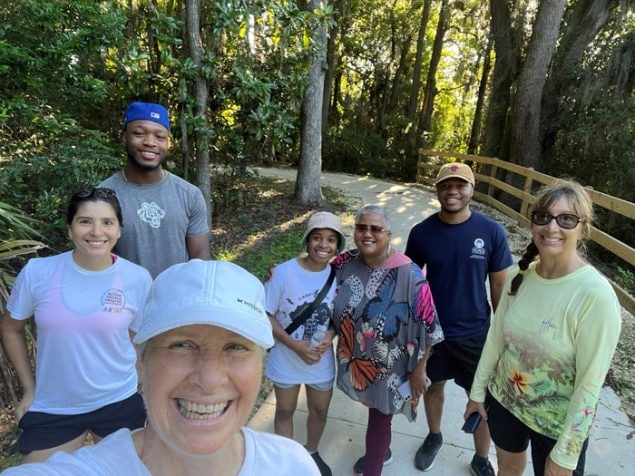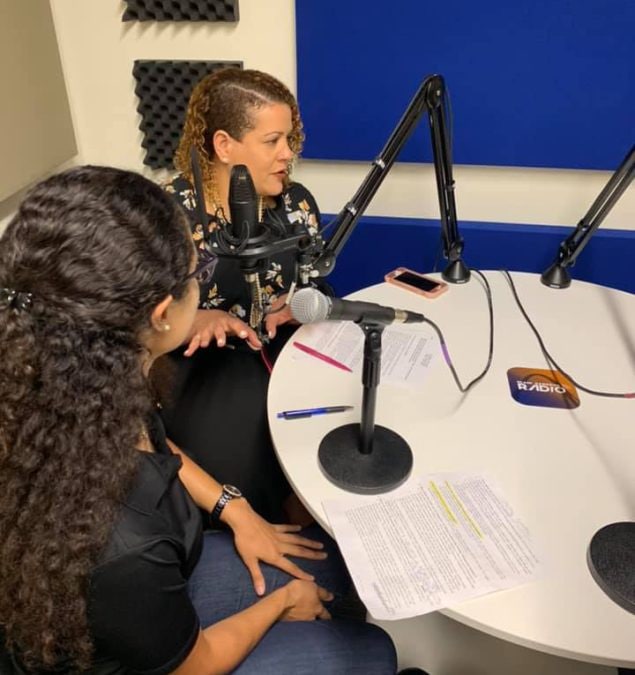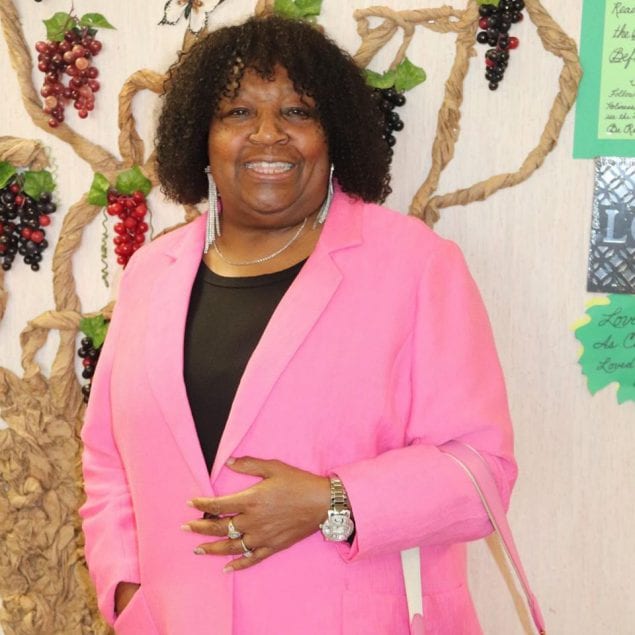2024 REACH Lark Galloway-Gilliam Awards for Advancing Health Equity Challenge

The third biennial Racial and Ethnic Approaches to Community Health Lark Galloway-Gilliam Award for the Advancing Health Equity (2024 REACH Lark Award Challenge) is now accepting applications. This award is in honor of Lark Galloway-Gilliam’s meaningful and far-reaching contributions to the REACH program and health equity.
Submissions now open
CDC’s Division of Nutrition, Physical Activity, and Obesity is pleased to announce applications are now open until June 21 for the 2024 REACH Lark Award Challenge. Read more about the Racial and Ethnic Approaches to Community Health (REACH) program.
Monday, April 29: Submissions for the Lark Award Challenge are now open. Application and the name of the nominee must be submitted by June 21 to be considered for this Awards cycle.
Friday, June 21 (11:59 p.m. EST): Entry application closes. No applications may be submitted for consideration after this date.
July—August: Judging process
Fall-Winter 2024: Winners will be announced
- Under the rules promulgated by U.S. Department of Health and Human Services;
- Comply with all the requirements under this section and satisfy one of the following requirements:
- Be a currently or previously funded CDC REACH recipient that has not previously received the REACH Lark Award Challenge in any year; or
- Be a technical assistance provider to past or current REACH recipients. Learn about DNPAO REACH recipients.; or
- Be a partner organization, part of a partner network, or coalition members that collaborated on REACH-related work with a current or previously funded REACH recipient;
- Be either:
- A U.S. citizen or legal permanent resident, eighteen years of age or older, if the nominee is an individual or group of individuals; or
- Incorporated in and maintain a primary place of business in the United States, if the nominee is an entity; where the United States means a state, the District of Columbia, the Commonwealth of Puerto Rico, and any other territory or possession of the United States;
- Not be a federal entity or federal employee acting within the scope of their employment;
- Not be a current employee of or contractor of CDC.
- Federal grantees shall not use federal funds from a grant or cooperative agreement to develop COMPETES Act challenge applications for this challenge;
- Federal contractors shall not use federal funds from a contract to develop COMPETES Act challenge applications or to fund efforts in support of a COMPETES Act challenge submission;
An individual or organization shall not be deemed ineligible because the individual or organization used federal facilities or consulted with federal employees during a competition if the facilities and employees are made available to all individuals and entities participating in the competition on an equitable basis.
Submission Guidelines
To compete for this award, individuals and organizations must submit an application form. Once completed, email the application form to the Division of Nutrition, Physical Activity and Obesity Policy Office at dnpaopolicy@cdc.gov.
Application Process
Requirements
- Responses to questions related to eligibility.
• Answers to three questions related to the nominee’s work.
• Each answer should be no longer than 300 words.
2024 REACH Lark Award Challenge Application [PDF-306KB]
Email your completed application form to dnpaopolicy@cdc.gov along with supplemental materials for consideration. The email subject line should indicate 2024 REACH Lark Award Challenge application and the name of the nominee.
Deadlines
The application period will open April 29, 2024. CDC will accept applications through June 21, 2024, 11:59 EST.
Prizes
No cash prize will be awarded. A maximum of two applicants (one individual and one organization/community coalition) associated with the REACH program will be a recipient of the 2024 REACH Lark Award Challenge.
Recipients of the REACH Lark Award Challenge will receive a plaque. While the recipient may be invited to meetings by CDC, attendance at such events is not required as a condition of accepting the award.
Judging Panel
CDC will select judges based on their knowledge of the REACH program, the science and practice of advancing health equity, and the elimination of health disparities at the national, state, or local levels.
Judges may include REACH program senior advisors, other CDC employees, or nonfederal individuals from outside the agency. Participating as a previous REACH Lark Award Challenge judge does not disqualify an individual or organization from being an award recipient for the 2024 challenge.
Conflict of interest issues related to Judges will be handled, per the Competes Act [15 U.S.C. § 3719 (k)(2)].
Judging Process
CDC will facilitate a panel of three to five judges that will review the applications and select up to two award recipients (one individual and one organization or community coalition) from all eligible entries in accordance with the scoring criteria in application form. Applications will be judged by:
- The extent to which the nominee worked to address chronic disease risk factors among priority populations experiencing health disparities for chronic disease including the following: Black or African American people, American Indian/ Alaska Native people, Hispanic or Latino people, Asian people, and/or Native Hawaiian/Other Pacific Islander people.
- The extent to which the risk factor(s) addressed align with the REACH program’s goals of advancing health equity. Find more information about past REACH programs. Examples of risk factors that align with the goals of the REACH program include poor nutrition, physical inactivity, inadequate access to clinical services, and tobacco use.
- The extent to which the nominee’s work contributed to developing, implementing, and/or evaluating strategies that were:
- Evidence-based or practice-based
- Culturally tailored, and designed to reduce health inequities
- Supportive of policy, systems, and/or environmental change
- The extent to which the nominee engaged members of the community and partners across different sectors in identifying and implementing strategies.
- The extent to which the nominee’s work resulted in progress toward addressing preventable risk factors in the population(s)/group(s) identified above.
Applicants can also submit supplemental materials that demonstrate the nominee’s work and/or impact. Supplemental materials are not to exceed 10 total pages. Examples of supplementary materials include: PDF of online content, and other forms of written materials e.g., news articles, evaluation reports, or success stories.
After the selection process is completed, top applicants (inclusive of the winner(s)) may be asked to participate in a telephone discussion about the interventions used by the individual or team to successfully promote health equity and reduce health disparities. Themes from these discussions may be shared publicly to provide information to promote innovative interventions that led to progress toward reducing health disparities.
Applicants, nominees, and the REACH Lark Award Challenge winners must comply with all terms and conditions of these Official Rules and winning is contingent upon fulfilling all requirements herein. The winners will be notified by email, telephone, or mail after the date of the judging.
Terms and Conditions
CDC reserves the right to cancel, suspend, and/or modify the Challenge, or any part of it, for any reason, at CDC’s sole discretion.
Participation in this Challenge constitutes an applicants’ full and unconditional agreement to abide by the Challenge’s Official Rules.
The “applicant” refers to each individual, organization, or community coalition that submits an application or nomination—and by participating—represents, warrants, and agrees that the entry contains accurate information. The “nominee” refers to each individual or organization/community coalition who is nominated, whether self-nominated or nominated by a separate individual or organization. If an applicant is nominating another individual, organization, community coalition (e.g., not self-nominating), the applicant must provide acknowledgement in writing that the nominee consents to being nominated.
Applicants and nominees must agree to be recognized if selected as a winner and agree to participate in an interview with CDC staff to provide information that may be used by CDC staff to write a success story that describes the intervention(s) that advanced health equity. Winners and their intervention(s) may be recognized, and the success story may be made public, including but not limited to, press releases, the challenge website, and Division of Nutrition, Physical Activity, and Obesity and CDC Resources, and other publicly available platforms (e.g., social media, CDC website, etc.).
By participating in this challenge, applicants agree to assume any and all risks related to participating in the challenge. Applicants also agree to waive claims against the federal government and its related entities, except in the case of willful misconduct, when participating in the challenge, including claims for injury; death; damage; or loss of property, money, or profits; and including those risks caused by negligence or other causes.
Email questions about your submission to CDC’s Division of Nutrition, Physical Activity and Obesity Policy Office at dnpaopolicy@cdc.gov.
Thank you for your interest in the 2024 REACH Lark Award Challenge.
About Lark Galloway-Gilliam
This award is in memory of Lark Galloway-Gilliam who was the founding executive director of Community Health Councils, Inc. The council began in 1992 to support planning, resource development, and policy education in response to the growing health crisis in South Los Angeles. The Council’s work extends to other communities throughout Los Angeles County.
Ms. Galloway-Gilliam led the Community Health Councils, Inc. to engage communities and strengthen the connections among organizations to improve health, eliminate disparities, and achieve health equity. Under Ms. Galloway-Gilliam’s leadership, the council became an expert in health equity in Los Angeles, across California, and in the country. Ms. Galloway-Gilliam also served in several leadership roles, including the Martin Luther King Jr. Medical Center Advisory Board, and the Institute for People, Place and Possibility Board of Directors for Community Commons. She was the first president of the National REACH Coalition.
Two REACH Lark Galloway-Gilliam Awards for Advancing Health Equity awards were given in 2022. Healthy Savannah received the organization award, and Thamara Labrousse received the individual award.
Organizational Award

Healthy Savannah staff on a group walk.
The Healthy Savannah (Georgia) Initiative was established in 2007 with the leadership of Mayor Otis Johnson, who sought to make Savannah a healthier place to live, learn, work, and play. Mayor Johnson had a heart attack in 2006 and knew that the risk of heart disease is higher among African American and Hispanic/Latino adults than other adults. His work to bring people together from many sectors to create a culture of health led to creation of Healthy Savannah.
In 2018, Healthy Savannah partnered with the YMCA of Coastal Georgia, and together they were selected as a recipient for CDC’s Racial and Ethnic Approaches to Community Health (REACH) program. REACH provided resources and expertise to create healthier nutrition and physical activity environments while focusing on achieving health equity and reducing health disparities.
In July 2022, Healthy Savannah received the organizational REACH Lark Galloway-Gilliam Award for Advancing Health Equity. The award recognizes Healthy Savannah’s efforts to reduce health disparities among African American and Hispanic/Latino American residents with low incomes in Chatham County.
Savannah is a tight-knit community with people committed to keeping it healthy and strong, said Paula Kreissler, Healthy Savannah executive director. Yet asking the community about their needs revealed that many residents have food insecurity, live in food deserts, and lack access to places to be physically active. Survey data also showed higher rates of chronic disease in neighborhoods with mostly African American residents.
“It started out difficult. But building relationships made it easier. I found someone in each organization to focus on health and wellness to build a network. It’s a beautiful thing once [people] find out you care about them and you’re compassionate about your work.”—Lessie Williams on assembling a network to advance health equity.
Listening to the community’s needs drove Healthy Savannah to focus on improving physical activity and nutrition. The group created programs such as:
- Healthy Walks encourages community members to walk through neighborhoods, local trails, and historic areas.
- Active People, Healthy Savannah, as part of CDC’s Active People, Healthy NationSM initiative, helped create 30 miles of urban trails through Tide to Town Trail.
- Healthy Checkout Initiative partnered with local grocery stores so shoppers can easily see fruit or other healthy options instead of candy near the checkout.
- FarmTruck 912, a mobile farmer’s market, brings local, affordable seasonal fruits and vegetables to Savannah neighborhoods. FarmTruck912 accepts and doubles the benefits of Supplemental Nutritional Assistance Programs (SNAP) and Electronic Benefits Transfer (EBT).
Individual Award

Thamara Labrousse, right, in a radio interview about increasing access to healthy food.
For Thamara Labrousse, Miami Gardens, Florida, is a beautiful, resilient, and strong city with a rich history and culture and an engaged community. With more than 113,000 residents, it is the third largest city in Miami-Dade County and the largest predominantly African American city in Florida. The city also has high rates of some chronic diseases, and city leaders are committed to making Miami Gardens a healthier place for people to live, work, and play.
In 2014, Miami Gardens partnered with the Health Foundation of South Florida to launch Live Healthy Miami Gardens (LHMG). The coalition includes 46 member organizations and more than 100 individuals working collectively for citywide changes that improve health and life expectancy. The coalition is dedicated to serving African American and Hispanic residents.
Ms. Labrousse was asked to become the program director of LHMG when it began because of her extensive experience with community engagement projects. In 2018, LHMG became a recipient of CDC’s Racial and Ethnic Approaches to Community Health (REACH) program.
Under Ms. Labrousse’s leadership, LHMG works to remove barriers associated with racial and ethnic health disparities while listening to and engaging the community at every step. Planning includes time for community outreach and data collection to allow community involvement, buy-in, and decision making.
“This work is all about community. You can’t effectively do without the very people who are the most impacted by the problem being at the table…. It can be very complex, and many days it may not feel like you are accomplishing anything, but keep going. If you keep showing up and trying, you will eventually find success.”—Thamara Labrousse
LHMG has made progress toward increasing access to healthy foods, opportunities for physical activity, and access to primary health care services and mental health resources. For example, LHMG worked with Miami-Dade County Public Schools to set up, support, and reinforce nutrition and healthy eating wellness policies in 25 Miami Gardens schools. LHMG and the schools also developed a comprehensive Safe Routes to Schools plan to create a safe environment around schools and promote opportunities to walk or bike to school. In addition, the coalition has carried out evidence-based strategies to address the misuse of alcohol, tobacco, and other drugs.
For her leadership in Live Healthy Miami Garden’s commitment to achieve health equity, Thamara Labrousse received the Individual REACH Lark Galloway-Gilliam Award for Advancing Health Equity in July 2022.

Lessie Williams
Lessie Williams received the first REACH Lark Galloway-Gilliam Award in August 2020. For 20 years, Ms. Williams worked for Highland Haven, a nonprofit organization in Portland, Oregon. For 5 years, she was the Highland Haven executive director. She created youth violence prevention programs, expanded access to culturally-relevant mental health services, and launched culturally-tailored health education programs to promote healthy behaviors such as healthy eating, physical activity, and tobacco cessation. Highland Haven partnered with the Multnomah County Health Department, a REACH recipient.
Before joining Highland Haven, Ms. Williams and two others formed a church committee in 2000. The committee’s goals were to give back to the community, build credibility within the community, and empower young people and families to become healthy adults.
Ms. Williams’ committee initially ran into obstacles gaining participation and funding. But the team kept looking for resources. They partnered with Multnomah County Health Department’s REACH program and focused on building the community one person at a time.
“It started out difficult. But building relationships made it easier. I found someone in each organization to focus on health and wellness to build a network. It’s a beautiful thing once [people] find out you care about them and you’re compassionate about your work.”—Lessie Williams on assembling a network to advance health equity.
The REACH program provided Ms. Williams’ team with technical assistance to determine their community assets and what changes they could implement. Together, they conducted surveys and planned events relevant to the needs of the community, including breastfeeding campaigns, nutrition education, and smoking cessation events. They formed relationships with faith organizations, health coalitions for people who are African American, and local businesses to achieve common goals.
Since beginning their work, Ms. Williams has seen an increase in the number of churches or faith communities with dedicated wellness teams. Additionally, Highland Haven and REACH influenced the social norms of the community by implementing nutrition guidelines and culturally appropriate health signage. Conversations about health and nutrition are now common, and the community expects healthy food and water at events. Highland Haven, with support from REACH, plays a critical role in providing access to healthy foods, while decreasing the availability of unhealthy items such as sugar-sweetened beverages.
